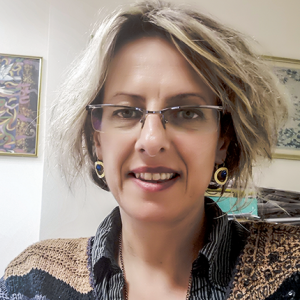
With what actions, the Region of Crete and HMU support those in need.
On the side of those who have suffered the consequences of the economic crisis, are in extreme poverty and have even been driven to depression, are the Region of Crete and the Hellenic Mediterranean University.
As Maria Papadakaki, Assistant Professor at the Department of Social Work of HMU, Director of the Laboratory for the Study of Health Behaviors and Road Safety, explains to Cretalive, the long-term economic crisis has left a strong mark on the Greek people. A large part of the population is at risk of poverty or social exclusion in Greece, while from 2009 onwards, there seems to be a steady increase in material deprivation in Greek households. According to data from the National Statistical Service, the risk of household poverty with an adult and at least one dependent child increased by 4.1 percentage points compared to 2018 and amounts to 36.9%.
The effects of the economic crisis on the health and mental health of the population are many and serious and are accompanied by a large increase in the demand for psychosocial care and social protection services. However, the high demand does not seem to be accompanied by an increase but by a continuous contraction of social services and the social protection and welfare system in general.
Access to counseling services is proving difficult for many of our fellow citizens, especially those who do not have sufficient resources, while the cost of services, childcare, moving to remote areas and much more seems to be obstacles to the timely search and reception of mental health services. health and welfare for people living in poverty.

In this changing socio-economic environment, in which there is an increased demand and at the same time limited supply of psychosocial care services, the European Aid Fund for the Poor (TEBA / FEAD) supports the distribution of food and basic material goods while combining in the social integration and psychosocial support of the beneficiaries.
The Program is implemented throughout the country through Social Partnerships and in our Region the responsibility is the Directorate of Public Health and Social Welfare of the Region of Crete under the coordination of Mr. Epitropakis Spyros and the Deputy Regional Minister of Public Health Mr. Vamvakas Lambrou.
The Hellenic Mediterranean University through the LaHeRS Laboratory of the Department of Social Work, from 2016 until today actively participates in the activities of the Region of Crete, which aim to alleviate people experiencing extreme poverty by intervening in the coverage of their psychosocial needs.
The most vulnerable
“As part of these actions, we conducted the first field research in the Region of Crete to 798 people from the four prefectures of Crete to get to know the profile of people who benefit from the programs of the Region, to record their needs and to examine the specific difficulties they face in different aspects of their daily life “, the professor explains. Almost half of those surveyed were married and a large percentage of them were elementary school graduates (32.6%). ΣτουςOne in two declared unemployed (47.7%) and 25.8% uninsured. The average duration of unemployment was 4.2 years while of the total number of employees, 48.3% reported occasional employment.
In terms of living conditions, 39.5% of people reported living in a private home and 26.8% in a relative’s home. A total of 18.0% did not have any heating in their home and about 10.0% did not have a toilet in the house. 12.0% of them had a complete lack of social support. Participants were also found to have serious health problems with 47.0% reporting chronic illness and 24.1% certified disability. Respective mental health problems were reported by a large percentage of participants with 26.0% being identified as “marginally positive” in depression and 49.3% showing “mild” to “severe” depressive symptoms, 40.5% experiencing “mild” to “severe” anxiety symptoms and 4.9% experienced a serious alcohol problem.
“In trying to identify the most vulnerable, we found that older people, the uninsured and people with a disability or chronic illness were found to be more vulnerable to depression than people in those categories. In terms of stress, women, older people, people with lower levels of education, people with more children, as well as people with disabilities and chronic illness, have been shown to be more vulnerable to stress. “Finally, people who had more children, the uninsured and those who reported chronic illness proved to be more vulnerable to serious problems with alcohol,” said Ms. Papadakaki.
Based on the above identified needs, the Department of Social Welfare of the Region of Crete, and the Hellenic Mediterranean University implement throughout the Region of Crete to prevent social exclusion through the provision of comprehensive and continuous care, focused on the whole family.
The beneficiaries of the program have the opportunity to receive guidance on daily problems faced by the whole family, from experienced professionals. Through individual and group counseling sessions and through innovative support mechanisms, we aim to empower individuals to self-manage their difficulties and improve their quality of life. Among the actions that we are implementing in the current period in all the municipalities of Crete are the following:
Individual counseling and psychological support
Those interested receive psychological or counseling support for any problem they face in their daily lives. The support is provided through individual sessions by experienced mental health professionals, research associates of the Hellenic Mediterranean University. The meetings are held on a weekly basis and aim to contribute to the management of stressful situations including the serious effects of the pandemic.
Mentoring
An electronic platform has been created, which supports the integration and reintegration of beneficiaries into work through: a) the organization of their job qualifications, b) the matching of their job profile with suitable job options, c) the connection with experienced professionals (mentors ) from various fields (eg economy, health, education, culture, sports, etc.), d) short apprenticeship with mentors with the aim of introducing them to new work environments or their specialization in areas of interest.
Parent schools
There are Parents’ Schools (groups of 12-15 people, with meetings on a weekly basis), in which the beneficiaries receive counseling support in order to strengthen their parental role. Participating in these groups helps to better understand the psychosynthesis, behavior and needs of their children and promotes best parenting practices. Among other things, the groups contribute to the learning of communication skills, the recognition, expression and management of emotions, the management of stressful situations in the family and the development of conflict resolution skills.
Social tutoring
Students attending the A ‘and B’ lyceum attend free classes, in special departments of the four Regional Units of Crete, in order to be strengthened in their effort to complete the school and achieve their admission to the university.
Home planning
The beneficiaries participate in experiential workshops that operate in all the Municipalities of Crete, and include group counseling aimed at learning cooking and baking skills as well as new approaches and values related to the Cretan diet. The workshops give the opportunity to a sufficient number of people, to learn to make better use of the raw materials they receive from the TEVA program, in order to improve their quality of life.
“Currently, more than 600 people are participating in our actions throughout Crete and this number continues to grow. The pandemic seems to have significant consequences on the quality of life of families in Crete, with intense socio-economic, emotional and psychological difficulties, family conflicts and problems related to the upbringing of children and the management of their daily needs.
The creation of accessible services that address the whole family and holistically cover the biopsychosocial needs of all its members, emerges as a major issue “, he notes.
